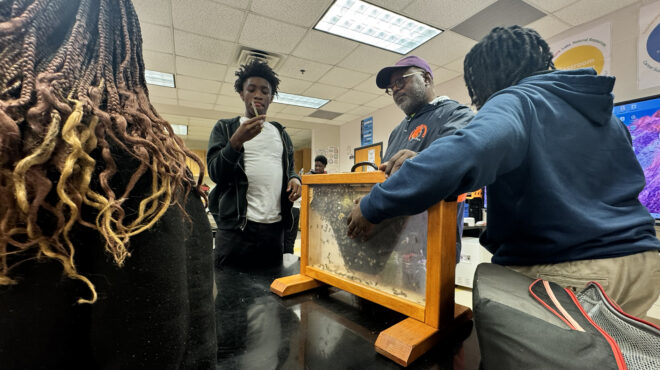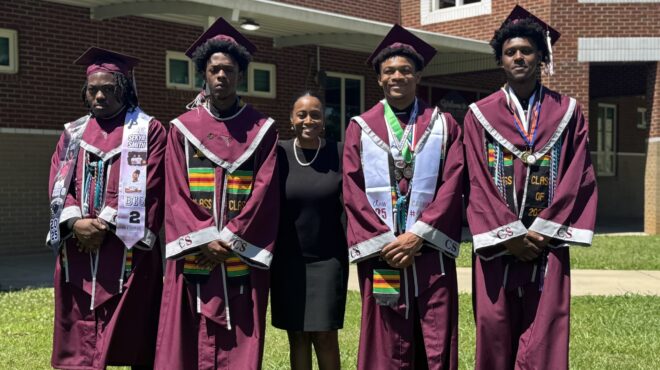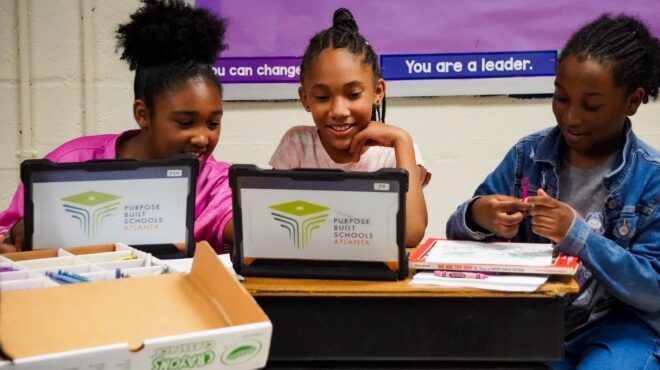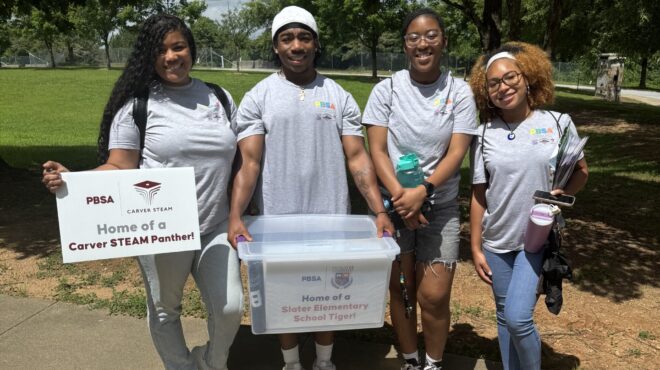Students should be hungry to learn. Not hungry for food
[envira-gallery-slider id=”1534″]
The south Atlanta community served by Purpose Built Schools has experienced food apartheid, or food insecurity, for decades. A household is food insecure when they are unsure about where their next meal is coming from due to a lack of resources—money, a place to buy food or transportation to get there.
According to the USDA Food Access Research Atlas, a significant share of residents in south Atlanta is more than one mile from the nearest grocery store. Without access to reliable transportation, as more than 100 households in the area have no access to a vehicle, families experience difficulty bringing home quality groceries to feed their families.
“Atlanta has one of the largest populations of food insecure people in the country,” says Greg Giornelli, president of Purpose Built Schools Atlanta. “According to research by Feeding America, one in 7.5 people, or an estimated 755,400 people, in metro Atlanta and north Georgia turn to food pantries and meal service programs to feed themselves and their families each year. This includes more than 164,000 children.”
Among those Atlantans experiencing food insecurity, 62 percent have had to choose between paying for food and paying for housing, and 73 percent have chosen between food and paying for medical care, according to Atlanta Community Food Bank, a PBSA partner.
“Students experiencing hunger can be less equipped to reach their full potential in school,” says Javan Wyche, School Engagement Manager at Purpose Built Schools Atlanta, who helps run the food distribution programs. “This community hasn’t historically had access to the food resources it deserves, and many students have arrived to our schools hungry.”
Studies show that children from homes that lack consistent access to food are more likely to experience developmental impairments in areas like language, motor skills, and behavior.
A study in The Journal of Nutrition using data from the 1999 National Survey of American Families found that food insecurity predicts poor school engagement partly because food-insecure children tend to be in poor emotional and physical health.
In a study published in the Journal of Children and Poverty, researchers found that food-insecure 6-11 year-olds scored lower than their food-secure peers on a measure of child intelligence and were more likely to have seen a child psychologist. They also found that these children had a harder time getting along with others, were more likely to have repeated a grade, and had lower arithmetic and general achievement test scores than food-secure children in the same age group.
Purpose Built Schools is partnering with several organizations to improve food security in South Atlanta, ensuring that students arrive to class with bellies full and minds ready to learn.
Each week, COR hosts The (COR)ner Store, a free market at Thomasville Heights Elementary School or Carver STEAM Academy, offering families groceries, clothing and hygiene supplies free of charge.
When schools closed for in-person learning in March, causing hundreds of families to suddenly lose access to meals, COR helped Purpose Built Schools distribute more than 3,000 pounds of food in nearby neighborhoods.
“Like Purpose Built Schools, we believe that a community is only as strong as its youth,” says Jennifer Henn, executive director of COR. “We partnered with Purpose Built Schools to make sure that students in the Carver cluster have their basic needs met–including support, tools and food–so they can flourish and thrive in school, and beyond. Since we started our weekly drive-through food distribution in March, we have distributed about 250,000 pounds of food to our community.”
Another partner, Urban Recipe, works with its members and supporters in creating food security, building community, and providing a platform for personal development while affirming dignity. Purpose Built Schools families had the opportunity to become a member of a food co-op that meets every two weeks and helped unload, sort, organize and distribute an average of 3,000 pounds of food to families in the community.
“We are helping create food security in south Atlanta, but we’re also providing a place where relationships and community are built,” says Jeremy Lewis, Urban Recipe. “The dignity of everyone involved is affirmed and, together, we’re meeting a critical community need.”
CARE, an international humanitarian nonprofit with headquarters in Atlanta, organized a coalition to deliver CARE Packages–boxes full of food and supplies–to help area families impacted by COVID-19.
“Families have enough to worry about with the pandemic and tough economic times,” says Ryan Shepard, Executive Director of the CARE Global Innovation Hub. “They should know where their next meal is coming from. This is just one of CARE’s initiatives to help address the impacts of poverty and the broader global food crisis. With the pandemic it was clear that many families are in desperate need of help to put food on their tables. And there are community members who are willing to stand in the gap to fill these needs.”
Access to quality food is also an issue. According to the ACFB, families experiencing food insecurity can save money by choosing cheaper options that lack nutritional value. Eighty-six percent of households who have benefited from the ACFB report purchasing inexpensive, unhealthy food because they could not afford healthier options.
Thomasville Heights Elementary School (THES) and The Paideia School are addressing food insecurity and poor food quality through urban farming.
Paideia supports the THES Farm through mentorship and a partnership that involves the sharing of knowledge, seeds, tools, materials and volunteers that enables the two schools to continue to learn and grow together and feed their communities. Combined, the farms grow approximately 5,000 lbs of high quality produce each year. Next year, they are positioned to produce even more as Paideia relocates its urban farm to a larger plot of land in south Atlanta. The new farm will be closer to THES, which will allow the alliance to better support each other.
“This program is about building bridges,” says Tania Herbert, Urban Agriculture Coordinator at The Paideia School. “It’s so encouraging that communities can come together and grow so much food with the understanding that we all benefit from it. This is a great example of a place-based agricultural model- a grassroots effort to grow and feed our families.”










